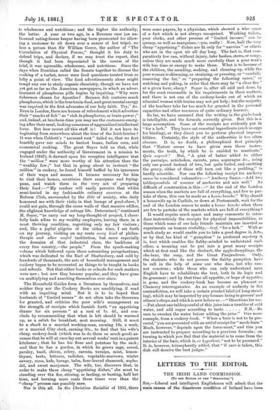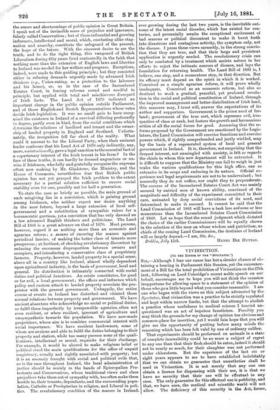LETTERS TO THE EDITOR.
THE IRISH LAND COMMISSION. [To THE EDITOR 07 THE " SPECTATOR:1
Sia,—Liberal and intelligent Englishmen will admit that the main causes of the disastrous condition of Ireland have been the errors and shortcomings of public opinion in Great Britain.
• I speak not of the invincible mass of prejudice and ignorance, falsely called Conservatism ; but of those influential and growing influences, intellectual and moral, which, combating alike stag- nation and anarchy, constitute the safeguard of the present, the hope of the future. With the sincerest desire to see the truth, and to do the right thing, this vanguard of British Liberalism during fifty years lived contentedly in the faith that nothing more than the extension of English laws and liberties to Ireland was needed for her welfare and progress. Exceptions, indeed, were made to this guiding principle ; but they consisted either in refusing demands urgently made by advanced Irish thinkers (e.g., Union-rating, as a protection to the labourer and his home), or, as in the case of the Incumbered Estates Court, in forcing reforms sound and needful in principle, but applied with total and mischievous disregard of Irish facts. The Land Act of 1870 indicated an important change in the public opinion outside Parliament, and of those English and Scotch Representatives whose votes decide Irish legislation. It was no small gain to have recog- nised the existence in Ireland of a survival differing profoundly in degree, partly even in kind, from the social conditions which determine the relations of landlord and tenant and the owner- ship of landed property in England and Scotland. Unfortu- nately, the recognition fell far short of the reality. What could it amount to for the Liberal Party, when their eminent leader confesses that his Land Act of 1870 only indirectly, nay, more, unintentionally, gave a legal sanction to the essential fact of a copartenary interest of the Irish tenant in his farm ? In the face of these truths, it can hardly be deemed ungracious or un- wise if Irishmen, who fully and gratefully recognise the supreme effort now making by Mr. Gladstone, the Ministry, and the House of Commons, nevertheless fear that British public opinion has not yet grasped the Irish problem to the extent necessary for a partial solution sufficient to ensure social stability even for one, possibly not for half a generation.
To state the case as briefly as possible, the main ground of such misgiving lies in a conviction, which is gaining ground among Irishmen, who neither expect nor desire anything in the near future, beyond a large extension of local self- government and a substitution of sympathic rulers for a bureaucratic garrison, yeta conviction that has only dawned on a few advanced English thinkers and politicians. The Land Bill of 1881 is a great advance on that of 1870. Most persons, however, regard it as nothing more than an economic and agrarian reform ; a _means of ensuring the masses against periodical famine, of making the better class of tenants more prosperous ; at furthest, of checking revolutionary discontent by reducing the enormous disproportion between owners and occupiers, and introducing a conservative class of proprietary farmers. Property, however, landed property in a special sense, above all in a country like Ireland, almost wholly dependent upon agricultural industry, is the basis of government, local and general. Its distribution is intimately connected with social duties and political functions. An estate constitutes, for good or for evil, a local government; the offices and influence which policy and custom attach to landed property associate the pro- prietor with the general government. Unhappily, the entire course of events in Ireland has disturbed and vitiated these normal relations between property and government. We have ancient absentees who acknowledge no social or political duties, or fulfil these imperfectly by irresponsible agencies, often not even resident, or when resident, ignorant of agriculture and unsympathetic towards the population. We have new-made proprietors, whose aim is to combine commercial interest with social importance. We have resident landowners, some of whom are anxious and able to fulfil the duties belonging to their property and station, while too many possess none of the quali- fications, intellectual or moral, requisite for their discharge. For example, it would be absurd to make religions belief or political creed the main qualifications for the office of unpaid magistracy, usually and rightly associated with property; but it is an anomaly fraught with social and political evils that, as is the case throughout Ireland, the local administration of justice should be mainly in the hands of Episcopalian Pro- testants and Conservatives, whose traditional views and class prejudices take them out of sympathy with, too often make them hostile to, their tenants, dependants, and the surrounding popu- lation, Catholic or Presbyterian in religion, and Liberal in poli- tics. The revolutionary condition of the masses in Ireland, ever growing during the last two years, is the inevitable out- come of the latent social disorder, which has existed for cen- turies, and perennially awaits the exceptional excitement of bad seasons or political discontent to make it burst forth into disastrous and contagions activity, the symptom only, not the disease. I press these views earnestly, in the strong convic- tion that they are true, and that their large and persistent application is urgently needed. The revolutionary crisis can only be combated by a treatment which assists nature in her efforts to reject the intimate sources of disease, and lays the foundation for returning health. The Land Bill of 1881 is, I believe, one step, and a momentous step, in that direction. But its efficacy must depend on the spirit in which it is worked. Conceived as a simple agrarian reform, it will prove wholly inadequate. Conceived as an economic reform, but also as destined to work a gradual, peaceful, yet profound revolu- tion in the social and political constitution of Ireland, through the improved management and better distribution of Irish land, this measure may, I trust will, answer the expectations of its author and supporters. Government is the prime need of Ire- laud; government of the true sort, which represses evil, irre- spective of class or rank, but fosters the growth and harmonioni action of all the social forces for good. Assuming that the re- forms proposed by the Government are sanctioned by the Legis- lature, the Land Commission will exercise functions and exercise powers which, if rightly comprehended and justly wielded, may lay the basis of a regenerated system of local and general government in Ireland. It is, therefore, not surprising that the deepest interest, not nnmingled with anxiety, is felt as regards- the chiefs to whom this new department will be entrusted. It is difficult to suppose that the Ministry can fail to weigh in just scales the various qualifications for this high office, one so- extensive in its scope and enduring in its nature. Official ex- perience and legal acquirements are not to be undervalued ; but assuredly they do not suffice, nor ought they to preponderate. The success of the Incumbered Estates Court Act was mainly secured by untried men of known ability, convinced of the magnitude and difficulty of the experiment committed to their care, animated by deep social convictions of its need, and determined to make it succeed. It cannot be said that the- Land Commission of 1881 will have a task less arduous or less- momentous than the Incumbered Estates Court Commission of 1849. Let us hope that the sound judgment which dictated the choice of the earlier Commissioners will be equally shown in the selection of the men on whose wisdom and patriotism, as chiefs of the coming Land Commission, the destinies of Ireland will so largely depend.—I am, Sir, &c.,



































 Previous page
Previous page